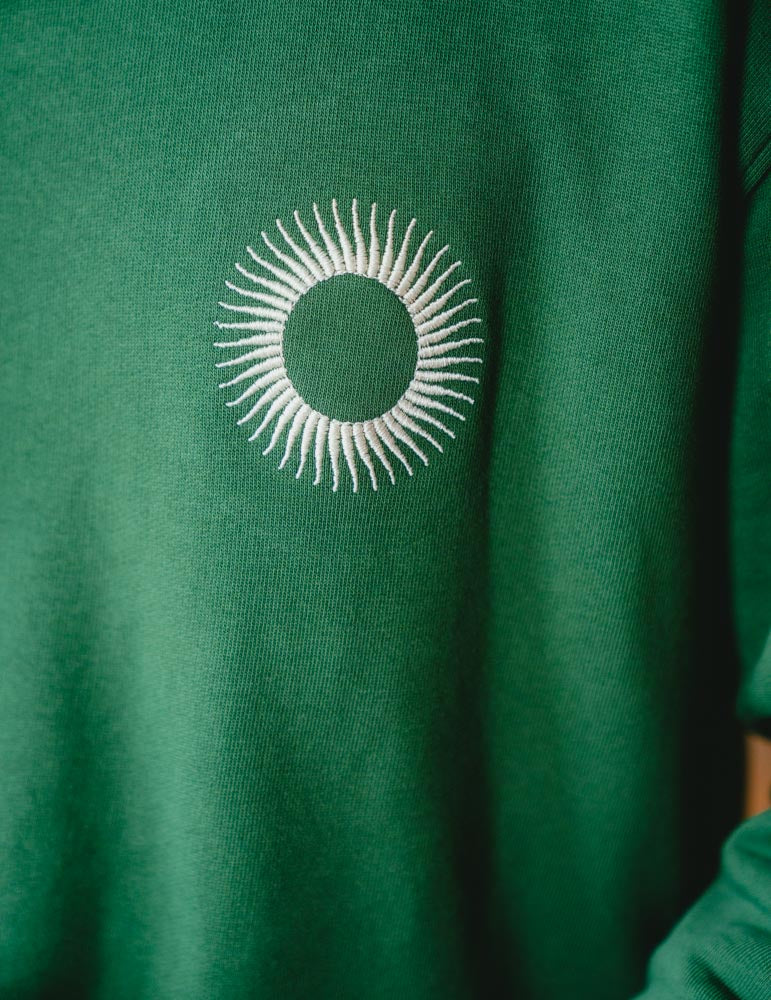"We have
decided to
put sustainable
thinking at
the center
of everything
we do!"

At Fresh Cuts, we choose fabrics that care for the environment and partner only with factories that share our commitment to positive impact. When we say sustainability is our core mission we don’t mean that sustainability is nice to have - we mean that it’s the only way we act.


Fresh Cuts Mission
At Fresh Cuts, sustainability is at the heart of everything we do. Not only do we only use GOTS-certified Organic Cotton but we are proud to share with you the various ways we prioritize the planet in our clothing production, from wind-powered mills to water conservation and the use of reactive dyes.
First and foremost, our commitment to renewable energy is exemplified through our use of wind-powered mills. By harnessing the power of the wind, we significantly reduce our reliance on fossil fuels and minimize carbon emissions. This ensures that our manufacturing processes have a minimal impact on the environment, helping to preserve our precious natural resources for future generations.
Water is a vital resource, and we recognize the importance of conserving it. That's why we have implemented innovative techniques and technologies to reduce water usage in our production processes. Compared to conventional methods, we have achieved an impressive 90% reduction in water consumption. By implementing responsible water management practices, we not only help preserve this valuable resource but also contribute to the well-being of communities and ecosystems affected by water scarcity.
Furthermore, we have embraced the use of reactive dyes in our clothing production. Reactive dyes are considered more environmentally friendly compared to traditional dyeing methods. These dyes create strong and vibrant colors while minimizing the release of harmful chemicals into water systems. By utilizing reactive dyes, we ensure that our garments maintain their stunning hues while reducing the impact on both human health and the environment.
Through these initiatives and practices, we strive to continuously improve our sustainability efforts and set a higher standard for the fashion industry. We believe that every step we take towards reducing our ecological footprint contributes to a healthier planet and a brighter future.
At Fresh Cuts, our commitment to sustainability extends beyond just words. We take concrete actions to ensure that our clothing is produced in a manner that respects the environment and promotes responsible practices. By choosing Fresh Cuts, you can be confident that you are making a positive choice for the planet without compromising on style.
FRESH CUTS CLOTHING MISSION
FRESH CUTS CLOTHING MISSION
FRESH CUTS CLOTHING MISSION
FRESH CUTS CLOTHING MISSION
FRESH CUTS CLOTHING MISSION
FRESH CUTS CLOTHING MISSION
FRESH CUTS CLOTHING MISSION
FRESH CUTS CLOTHING MISSION
FRESH CUTS CLOTHING MISSION
FRESH CUTS CLOTHING MISSION
Certification
Global Organic Textile Standards (GOTS) is the world’s leading certification for organic textiles. Their main focus is to check the organic status of the cotton. For a garment to be GOTS-certified with a ''Label-grade 1'', it must contain 95-100% organic cotton, and should never be mixed with conventional cotton. GOTS is the most reliable certification and the only one that makes sure makes sure no toxic chemicals have been used at any steps of your garment’s production.
The Global Recycled Standard is the first standard that aims to set requirements for products made out of recycled materials. The GRS certification is a holistic standard that verifies that a product has the recycled content it claims to have. The Standard applies to products that contain 20% or more Recycled materials, but also apply to the supply chain of companies involved in the production of GRS products.
Fair Wear Foundation (Fair Wear) is an independent multi-stakeholder organisation that works with garment brands, garment workers and industry influencers to improve labour conditions in garment factories. Fair Wear's eight labour standards are:
• Employment is freely chosen
• There is no discrimination in employment
• No exploitation of child labour
• Freedom of association and the right to collective bargaining
• Payment of a living wage
• No excessive working hours
• Safe and healthy working conditions
• Legally binding employment relationship
Suppliers
At Fresh Cuts we only partner with suppliers that we trust and that share the same views and standards as us. We have met and built a strong relationships with them that will allow us to grow and work together. We have the same common goals and respect that. Our partners are certified by world wide recognized standards. This means that the factories that work for us are audited on a regular basis and must conform to certain social and ethical standards in both their manufacturing process and labor standards. In most cases our partners go above the standards that's required of them. We work with Three suppliers all based India.
Our first supplier is used for our
bespoke hoodies, crew and t shirts made of organic cotton jersey. A small business with 100 workers (65% women and 35% men) they believe in order for
future generations to survive on this planet changes must be made. They are both GOT’s & Fair Trade certified. They are sourcing yarns from mills that are powered by Wind energy resulting in a carbon neutral fabric and are
implementing solar power for their sewing factory. They are reusing 90% of waste water using RO System and the other 10% waste which is sludge is being
used for manufacturing of building materials like cement blocks. On the labour side of the business they invest in social programs for the employees, such as financing medical insurance. They're paying living wages to their workers which
are higher than the minimum wages of Industrial benchmark described by Indian Labour.
This allow them to cover all their living expenses.
Our Second factory is a wholesale supplier who we source a variety of organic cotton jersey tees from. The factory is powered by renewable energy from solar panels and windmills, which makes the production even greener. They are a vertically integrated manufacturer meaning they have everything in house, from spinning mills to the finishing process. With 1600 staff (50% Male 50% Women) this is a much larger organization but still conforms to all our strict standards and is GOTs, SA8000, Fairtrade and Fear Wear certified. Labour conditions are reviewd under the Fair Wear certification and they are fully accredited.
Our third and newest factory is where we produce our woven products. It is where our new line of Fresh Shirts are being produced and we intend to grow this range over the next few years. The factory started in 2001 and is owned by pioneers in sustainable garment production. It is GOTs, Fairtrade & SA 800 certified. With independent audits and accredited bodies they support fair wages, no child labour, workers rights, gender equality and grower communities.
Fabrics
Accordion pane content
Plastic never goes away. It just breaks down into smaller pieces and eventually ends up as microplastics that pollute the environment. But since we have all the plastic we need on this planet, it’s about time we reuse it in a smart way. By working with Recycled polyester we bypass the oil extraction required to make virgin polyester. And that's a game-changer. By doing this, the production uses 59% less energy and emits 32% less Co2. The production also saves significant amounts of water compared to virgin poly production. A circular world is a better world!


